So, you’ve caught the stargazing bug—welcome to the club! Whether it was a dazzling meteor shower, a mesmerizing image of Saturn’s rings, or just a late-night curiosity about what’s out there, your interest in the night sky has officially taken flight. Now you’re wondering: “What telescope should I get to actually see this stuff?”
I’ve been there, and let me tell you—choosing your first telescope can feel a bit like falling into a black hole of options. There are tons of models, confusing specs, and price tags that range from “affordable” to “do I need a NASA budget for this?” But don’t worry, I’ve done the digging for you.
In this beginner-friendly guide, I’ll walk you through the top 10 telescopes for beginners in 2025, with detailed insights, honest pros and cons, and what each one is best suited for—whether you’re looking to gaze at the Moon, spot distant planets, or dive into deep-sky objects like nebulae and galaxies.
Let’s get you set up with the perfect telescope to launch your stargazing journey.
Disclaimer: This article contains affiliate links
1. Celestron NexStar 130SLT Computerized Telescope
Overview: The Celestron NexStar 130SLT is a 130mm Newtonian reflector telescope equipped with a fully computerized altazimuth mount. Its SkyAlign technology allows for quick and easy alignment, making it user-friendly for those new to astronomy. The telescope’s compact and portable design makes it suitable for both backyard observations and trips to dark-sky locations.
Key Features:
- Aperture: 130mm (5.12 inches)
- Focal Length: 650mm (f/5)
- Mount: Computerized Altazimuth Single Fork Arm
- Eyepieces: 25mm (26x) and 9mm (72x)
- Finderscope: StarPointer™ red-dot finderscope
- Database: NexStar+ hand control with 40,000 celestial objects
- Alignment: SkyAlign technology for quick setup
- Power Supply: Operates on 8 AA batteries or external 12V power source (not included)
- Portability: Lightweight optical tube and pre-assembled tripod for easy transport
Pros:
- Quick and easy no-tool setup
- Computerized tracking simplifies locating celestial objects
- Large aperture gathers ample light for clear views
- Suitable for both planetary and deep-sky observations
Cons:
- Tripod may be less stable on uneven surfaces
- Battery operation can be limiting; external power recommended for extended sessions
Best For: Beginners and intermediate users seeking a computerized telescope that offers a balance between ease of use and powerful optics for exploring a wide range of celestial objects.
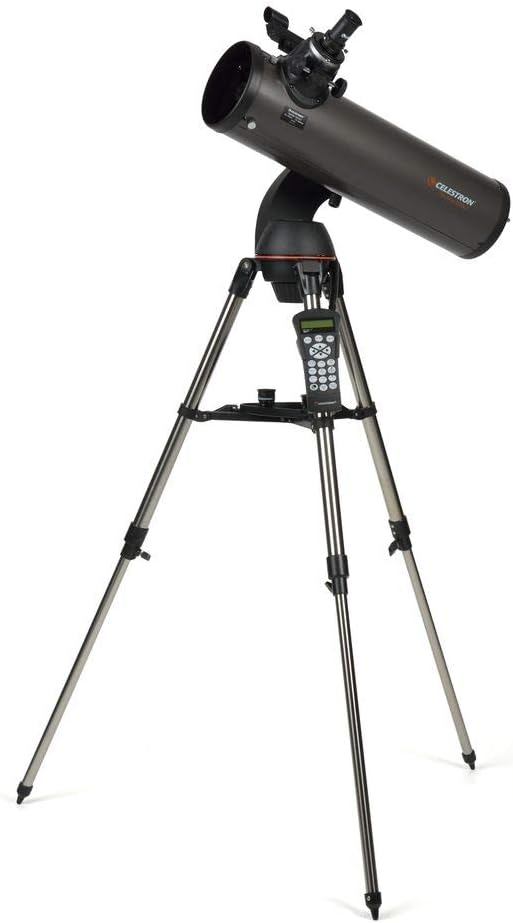
2. Celestron NexStar 8SE
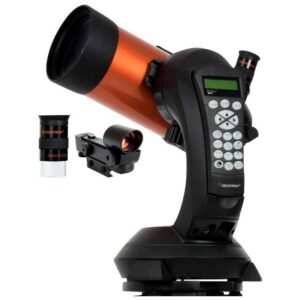
Overview: A top-tier computerized telescope with a large aperture, ideal for beginners seeking advanced features.
Key Features:
- 8-inch (203mm) aperture for exceptional light-gathering.
- Fully computerized GoTo mount with a database of 40,000+ celestial objects.
- SkyAlign technology for quick and easy setup.
Pros:
- High-quality optics provide crisp and clear images.
- User-friendly interface suitable for beginners.
- Portable design despite its powerful capabilities.
Cons:
- Higher price point may not suit all budgets.
- Requires a power source for extended use.
Best For: Beginners ready to invest in a high-quality, feature-rich telescope.
3. Celestron NexStar 4SE
Overview: A compact, computerized telescope that locates and tracks objects for you. Perfect for those who want to dive into astronomy without the learning curve.
Key Features:
- 102mm Maksutov-Cassegrain optical design for sharp images.
- SkyAlign technology for quick alignment.
- Database of over 40,000 celestial objects.
Pros:
- Compact size and portability make it easy to transport.
- Accurate tracking system enhances viewing experience.
- Sturdy tripod provides stability during observations.
Cons:
- Some users find the setup process challenging.
- Battery consumption is high; an external power source is recommended.
Best For: Urban dwellers and beginners seeking convenience.
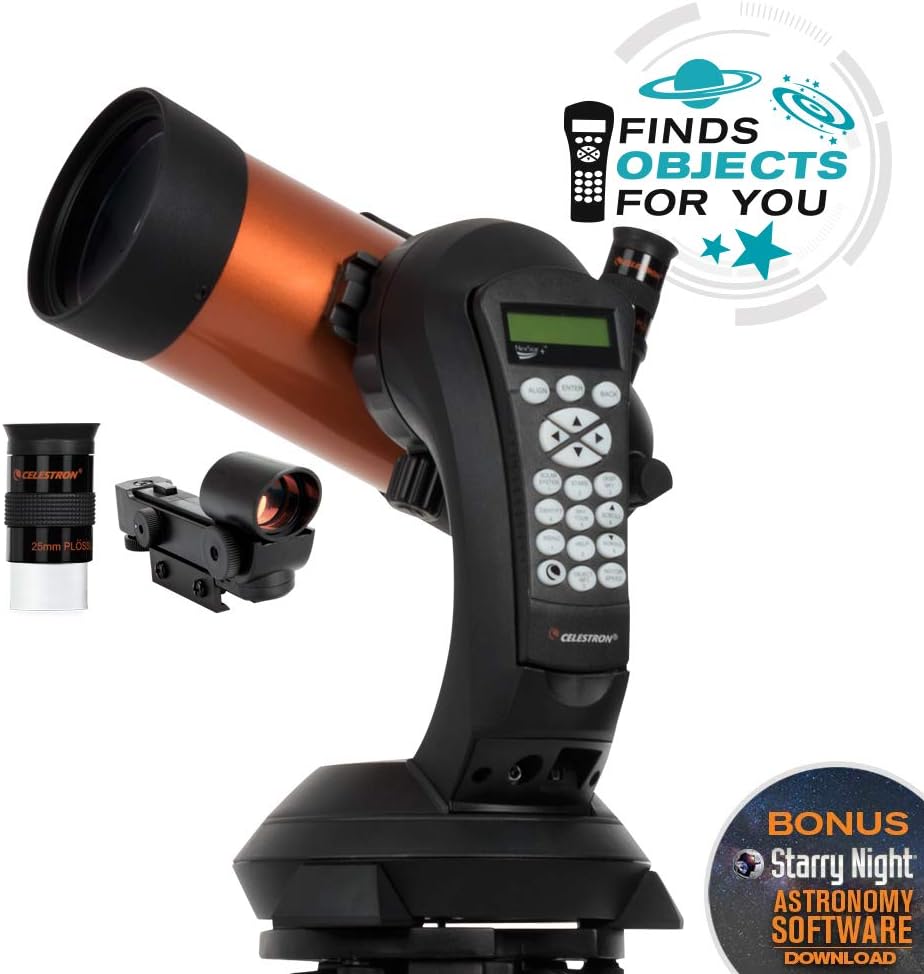
4. Celestron Astro Fi 130
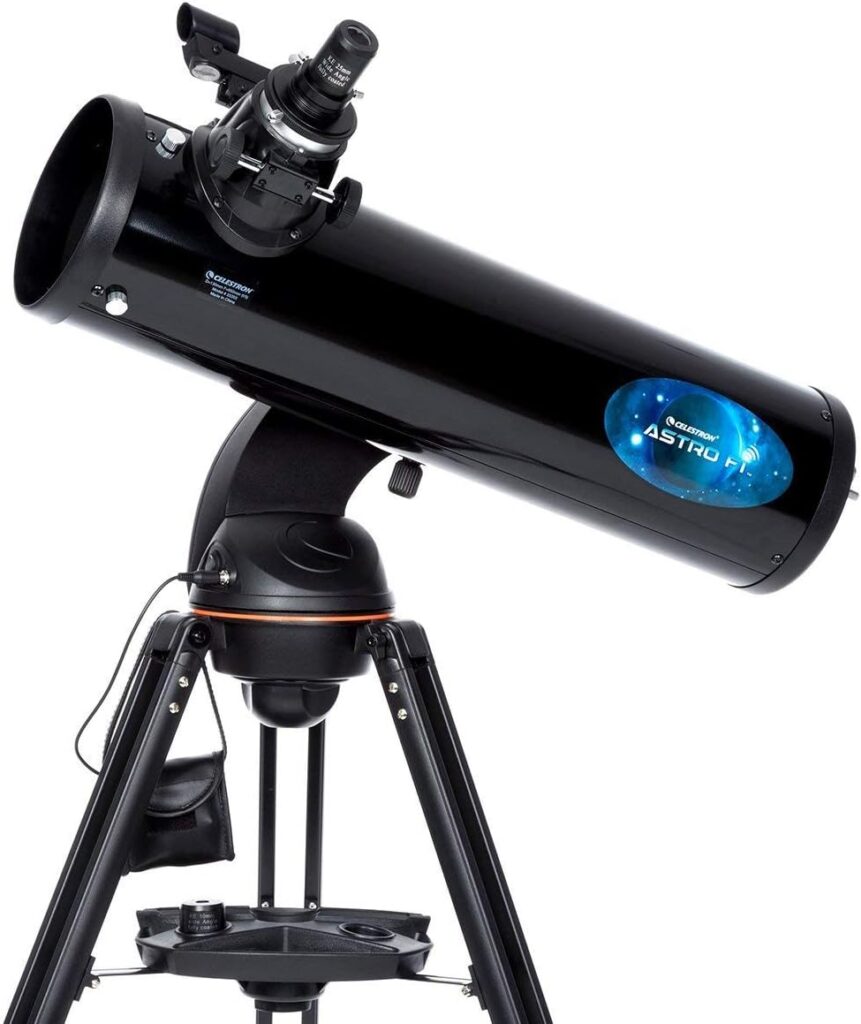
Overview: A Wi-Fi-enabled telescope that allows you to control it via your smartphone or tablet, making stargazing more interactive.
Key Features:
- 130mm aperture Newtonian reflector.
- Fully computerized GoTo mount.
- SkyPortal app integration for seamless control.
Pros:
- Wireless control enhances user experience.
- Good optical quality for the price.
- Easy to set up and align.
Cons:
- Requires a stable Wi-Fi connection.
- Battery life can be limited; consider using an external power source.
Best For: Tech-savvy beginners looking for a modern stargazing experience.
5. Sky-Watcher Heritage 130P FlexTube
Overview: A collapsible design makes this telescope highly portable without compromising on performance.
Key Features:
- 130mm aperture with parabolic mirror.
- Compact, tabletop design.
- Easy to store and transport.
Pros:
- Excellent optical performance for its size and price.
- Highly portable, ideal for camping and travel.
- Quick and straightforward setup process.
Cons:
- Requires collimation, which may be challenging for beginners.
- Tabletop design necessitates a stable surface for optimal use.
Best For: Astronomy enthusiasts with limited space or those who travel frequently.
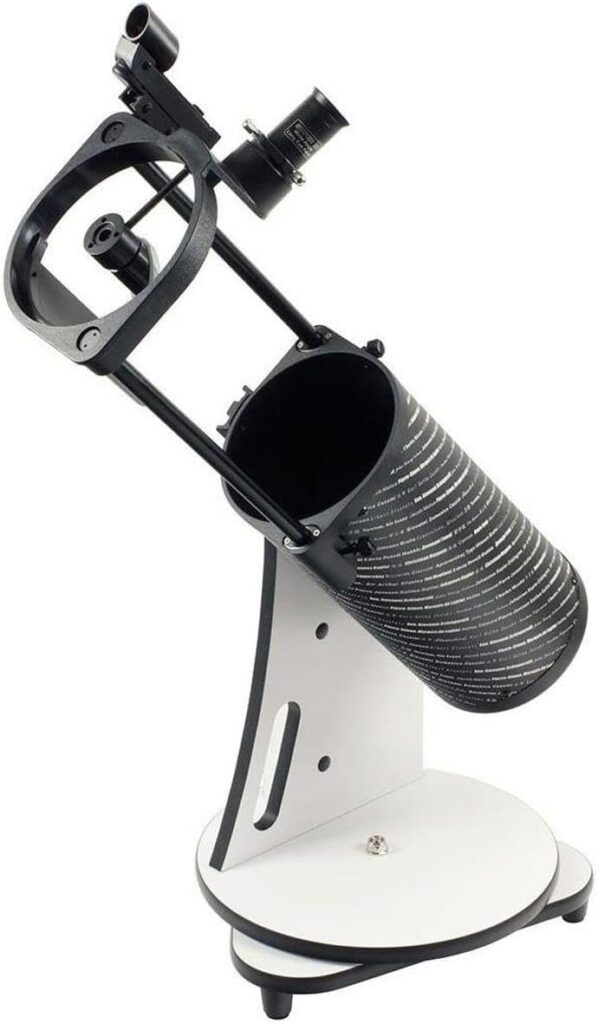
6. Sky-Watcher Classic 200 Dobsonian 8-inch Telescope
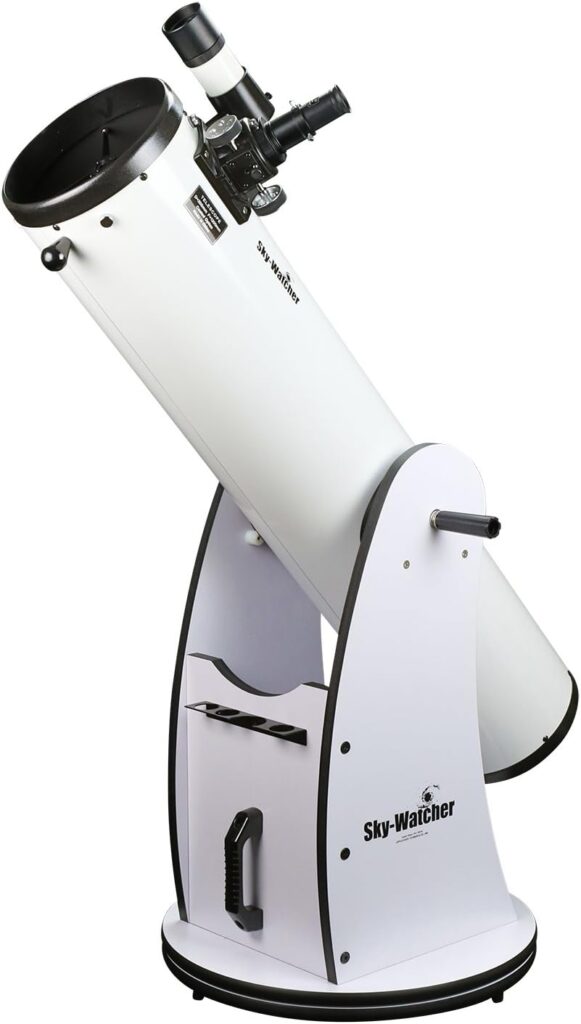
Overview: The Sky-Watcher Classic 200 is a powerful 8-inch Dobsonian reflector that strikes an excellent balance between aperture, performance, and price. It’s a fantastic choice for beginners who are serious about stargazing and want a telescope that will grow with them as their skills develop.
Key Features:
- Aperture: 203mm (8 inches)
- Focal Length: 1200mm (f/5.9)
- Mount: Dobsonian base with Tension Control Handle
- Eyepieces: 25mm and 10mm Plössl
- Accessories: 2″ Crayford-style focuser with 1.25″ adapter, 9×50 finderscope
- Weight: Approx. 40 lbs assembled
Pros:
- Excellent light-gathering capability—ideal for deep-sky objects
- Easy-to-use Dobsonian mount—great for beginners
- Smooth, intuitive altitude and azimuth movement
- High-quality optics with sharp, bright views
- Durable and sturdy build
Cons:
- Bulkier and heavier than smaller scopes—less portable
- No GoTo or tracking system (manual navigation only)
- Requires assembly and collimation knowledge
Best For:
Beginners who are committed to diving deep into amateur astronomy, especially those interested in observing galaxies, nebulae, star clusters, and planets from dark-sky locations.
7. Celestron StarSense Explorer DX 130AZ
Overview: This telescope integrates with your smartphone, guiding you to celestial objects using the StarSense app. It’s like having a personal astronomy assistant.
Key Features:
- 130mm aperture for clear views of planets and deep-sky objects.
- Altazimuth mount with slow-motion controls for smooth tracking.
- User-friendly setup, ideal for beginners.
Pros:
- Easy to set up and use, making it great for beginners.
- The StarSense app simplifies locating celestial objects.
- Offers good value for the price.
Cons:
- Some users reported mixed experiences with the telescope’s functionality and clarity.
- Instructions may be lacking in detail, requiring additional research for setup.
Best For: Beginners seeking a blend of technology and traditional stargazing.

8. Celestron AstroMaster 70AZ
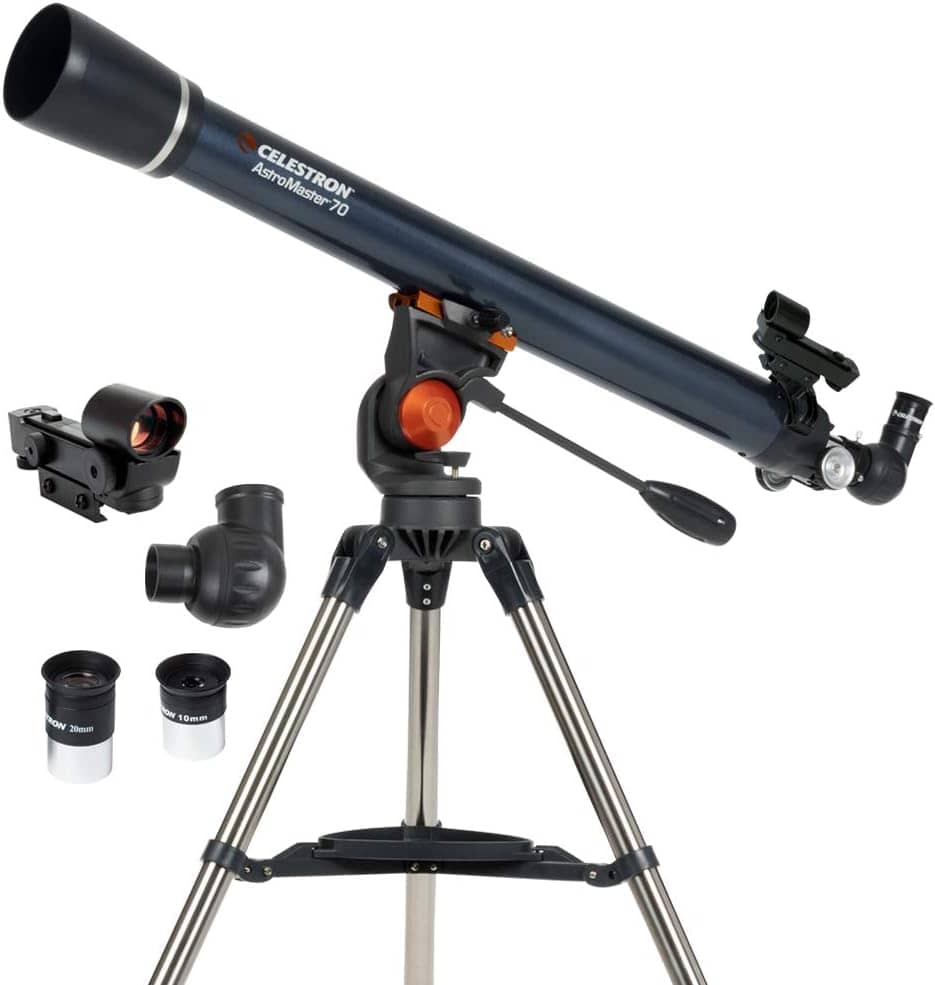
Overview: The Celestron AstroMaster 70AZ is a user-friendly refractor telescope designed for beginners interested in exploring the Moon, planets, and terrestrial objects.
Key Features:
- Aperture: 70mm (2.8 inches) achromatic refractor.
- Focal Length: 900mm (f/13), providing high-contrast views with minimal chromatic aberration.
- Mount: Manual Alt-Azimuth with pan handle for smooth tracking.
- Eyepieces: Includes 20mm (45x) and 10mm (90x) Kellner eyepieces.
- Accessories: Comes with a red-dot StarPointer finderscope, erect image diagonal for terrestrial viewing, and an adjustable-height tripod.
Pros:
- Affordability: Priced competitively, making it accessible for beginners.
- Ease of Use: No-tool setup and straightforward operation.
- Versatility: Suitable for both astronomical and terrestrial observations.
- Portability: Lightweight design facilitates transport and storage.
Cons:
- Mount Stability: The tripod can be wobbly, especially when fully extended.
- Limited Deep-Sky Viewing: The 70mm aperture restricts visibility of faint deep-sky objects.
- Basic Accessories: Eyepieces and diagonal are functional but may benefit from upgrades for enhanced performance.
Best For: Beginners seeking an affordable, easy-to-use telescope for lunar, planetary, and terrestrial observations.
9. Celestron AstroMaster 130EQ Newtonian Telescope
Overview: The Celestron AstroMaster 130EQ is a 130mm Newtonian reflector telescope mounted on a German equatorial mount. Its larger aperture allows for brighter and more detailed views of celestial objects, making it an excellent choice for beginners eager to explore the night sky.
Key Features:
- Aperture: 130mm (5.1 inches)
- Focal Length: 650mm (f/5)
- Mount: German Equatorial Mount with setting circles
- Eyepieces: 20mm and 10mm
- Accessories: StarPointer red dot finderscope, adjustable-height tripod
Pros:
- Larger aperture for brighter and more detailed images
- Equatorial mount allows for precise tracking of celestial objects
- Suitable for both planetary and deep-sky observations
- Sturdy construction with a stable tripod
Cons:
- Equatorial mount may have a learning curve for absolute beginners
- Manual tracking; no motorized features
Best For: Beginners seeking a versatile telescope with a larger aperture for exploring a wide range of celestial objects, from planets to deep-sky phenomena.
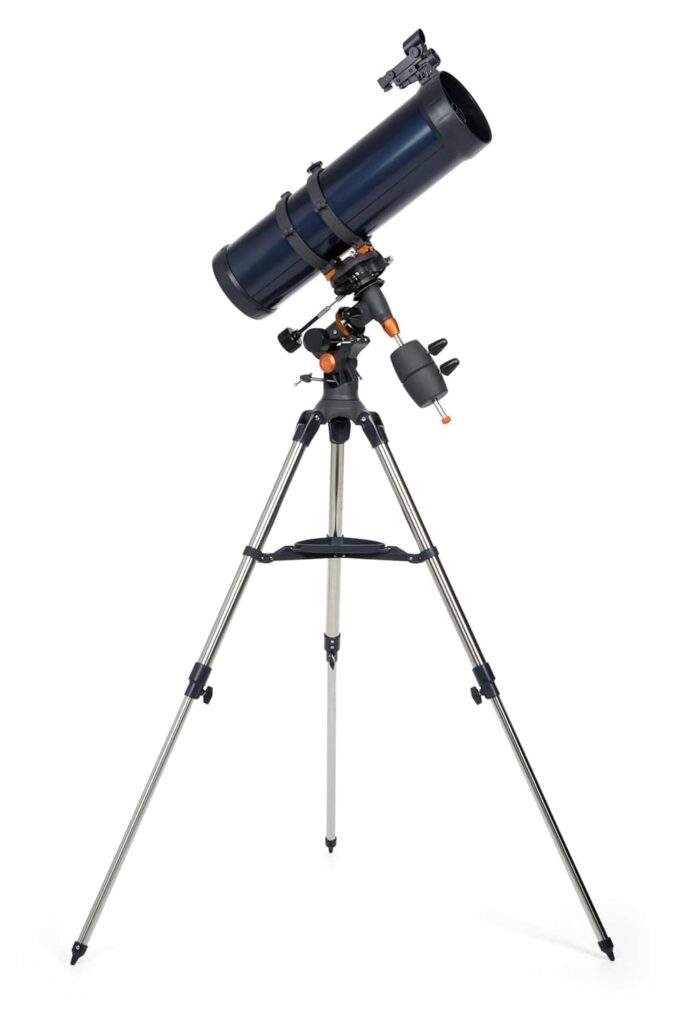
10. Zhumell Z114 Portable Altazimuth Reflector Telescope
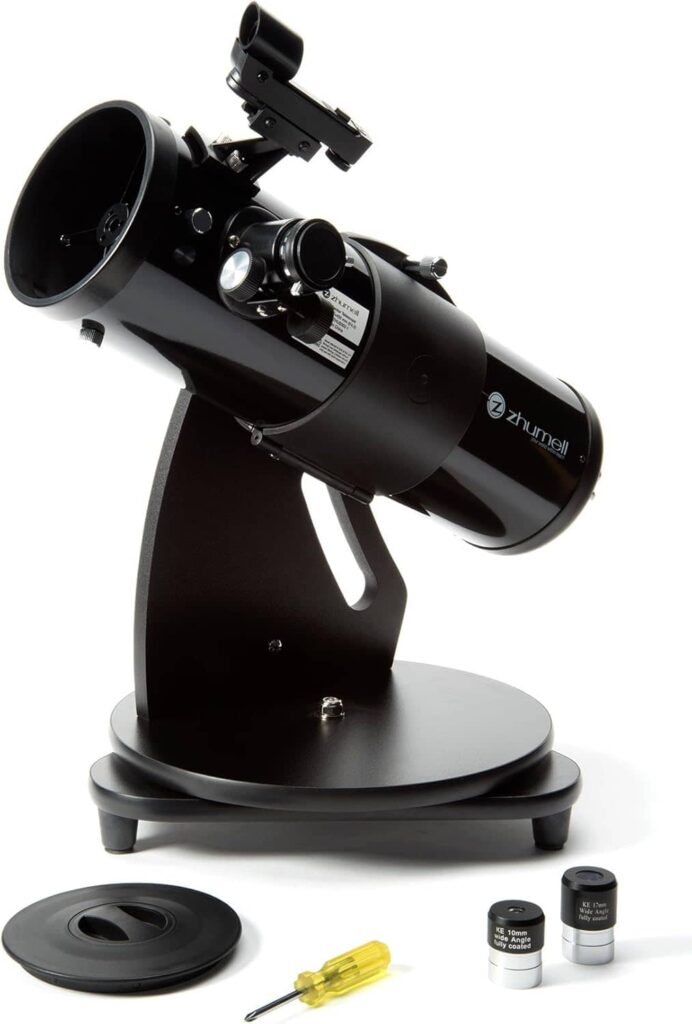
Overview: The Zhumell Z114 is a tabletop Newtonian reflector telescope with a 114mm aperture, offering bright and clear views of the night sky. Its compact design and ease of use make it perfect for beginners and those with limited space.
Key Features:
- Aperture: 114mm (4.5 inches)
- Focal Length: 465mm (f/4)
- Mount: Altazimuth
- Eyepieces: 17mm and 10mm
- Additional Accessories: Red-dot finder, 1.25” focuser
Pros:
- Bright, wide-field views suitable for various celestial objects
- Compact and lightweight; easy to transport
- Simple setup with minimal maintenance
Cons:
- Manual tracking; no motorized features
- Requires a stable surface for optimal use
Best For: Beginners and casual observers looking for an affordable, portable telescope with quality optics for general stargazing.

Hi, I’m Debashis! I’m a space enthusiast and science writer with a passion for exploring the mysteries of the universe. From black holes to exoplanets and everything in between, I love diving deep into cosmic phenomena and sharing what I learn in an engaging, easy-to-understand way.
If you’d like to talk about space, share your thoughts, or collaborate on a project, feel free to put a comment on the post or drop me an email at debashis.mandal[at]gmail.com.

